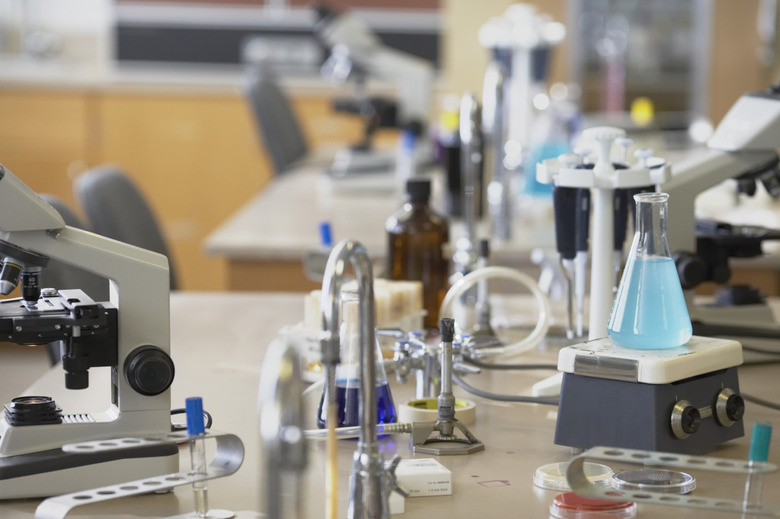Microbiology Vs. Biochemistry
Biology is the study of living organisms. Biology includes many sub-disciplines, such as microbiology and biochemistry. Microbiology studies microorganisms, while biochemistry studies the building blocks that compose organisms. Although distinct areas of biology, the two share many attributes.
Microbiology
Microbiology
Microorganisms, which can only be seen under a microscope, include bacteria, viruses, fungi, and some small parasites. Topic microbiology encompasses include classifying the different types of microorganisms, studying their life cycles and growth patterns, and discovering the mechanisms by which they infect other organisms. Methods for removing and preventing infections by microorganisms are another important aspect of microbiology, that also involves the development of antibiotics and vaccines.
Biochemistry
Biochemistry
Biochemistry uses chemistry to study biological processes. It involves the study of the building blocks of living organisms, called macromolecules. These include proteins, lipids, carbohydrates and nucleic acids. Biochemistry covers how these macromolecules are produced, how they interact with others and what their function is within an organism. Biological processes studied through biochemistry cover diverse topics, including metabolism, gene expression and cell division.
Similarities
Similarities
Although microbiology and biochemistry focus on different aspects of biology, they also overlap. Understanding of the proteins involved in bacterial metabolism allows you to study their growth patterns. Similarly, understanding the macromolecules composing the receptors used for viruses to bind to and infect human cells allows your to study the infection patterns of viruses. Another area of overlap is in recombinant DNA technology. In this field, bacterial or yeast cells are used to produce human proteins, making them readily available as vaccines or other drugs.
Differences
Differences
The major difference between microbiology and biochemistry is that biochemistry involves the study of the macromolecules that make up an organism, while microbiology studies the organism as a whole. Microbiology studies the way an entire organism, such as a virus, lives and infects its host. Biochemistry, however, focuses on specific macromolecules and how they come together to form larger structures, such as cells or tissues, or how they interact with each other to carry out the complex reactions necessary to keep an organism alive, such as metabolism of carbohydrates into energy, or expressing genes.
Cite This Article
MLA
Thompson, Noelle. "Microbiology Vs. Biochemistry" sciencing.com, https://www.sciencing.com/microbiology-vs-biochemistry-7943/. 24 April 2017.
APA
Thompson, Noelle. (2017, April 24). Microbiology Vs. Biochemistry. sciencing.com. Retrieved from https://www.sciencing.com/microbiology-vs-biochemistry-7943/
Chicago
Thompson, Noelle. Microbiology Vs. Biochemistry last modified August 30, 2022. https://www.sciencing.com/microbiology-vs-biochemistry-7943/
